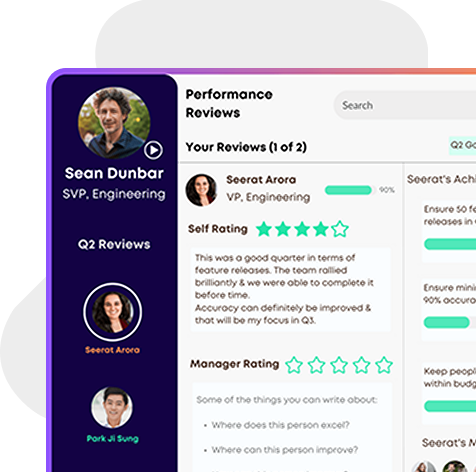

How to Write a Performance Review for Your Manager + Examples

Overview
Writing a performance review for a manager requires a thoughtful approach that balances feedback with growth opportunities.
From leadership style to decision-making and team development, below are the steps on how to write an exceptional performance review for your manager:
- Start with an Overview of Their Leadership
- Provide Constructive Feedback on Communication
- Evaluate Their Decision-Making & Problem-Solving Skills
- Assess Their Support for Employee Growth & Development
- Highlight Areas for Improvement & Suggestions for Growth
Employee feedback is essential for managers to develop leadership and team performance. It offers valuable insights into your manager's strengths and weaknesses. It helps you foster a culture of continued improvement, resulting in higher engagement and better team outcomes.
The role of upward feedback supports enhancing your manager's leadership skills by identifying their strengths and weaknesses. There is a sense of improved communication and engagement, increased empathy, and better emotional intelligence. It helps improve how your manager leads your team with enhanced collaboration, motivation, and engagement.
In this blog, learn how to write a performance review for your manager to make it more professional, constructive, and actionable.
Why Writing a Performance Review for Your Manager Matters
Knowing how to write your manager's performance review could be a key to their advancement and team success. This review system provides your managers with practical feedback to help them better understand what they are doing well and where they need to improve.
A deeper understanding of this area helps your managers focus on improving their roles and fostering their growth as leaders.
Here are some key benefits of writing your manager's performance review:
- Encourages open communication and transparency.
- Helps managers improve leadership, decision-making, and team engagement.
- Creates a culture of continuous improvement and mutual respect.
- Managers who receive constructive feedback are more likely to adapt and improve.
Key Elements of a Strong Manager Performance Review
A strong manager's performance review program is focused more on clear expectations and constructive feedback. It should always be a two-way communication process emphasizing understanding their strengths and weaknesses as team leads. This understanding is crucial for your manager to set their actionable goals and work on their continuous development as a leader. Here are some key elements for how to write a performance review of your manager:
- Be objective and factual: Avoid personal bias and focus on performance.
- Use specific examples: Illustrate feedback with real situations and outcomes.
- Balance positive feedback and constructive criticism: Highlighting both strengths and areas for improvement.
- Keep it professional and solution-oriented: Avoid complaints without suggestions for improvement.
{{cta-1}}
How to Write a Performance Review for Your Manager in 5 Steps
To achieve consistency in writing a performance review for your manager, start with a repeatable process. A well-structured performance evaluation system ensures your reviews are fair, subjective, and focused on what matters. Here are five easy-to-follow steps on how to write a performance review for your manager:
Step 1: Start with an Overview of Their Leadership
Your first step in writing a performance review for your manager includes evaluating their leadership style. Such evaluations directly impact your manager's influence on your team's performance, achievements, productivity, and morale. They should be able to identify and nurture your team's growth. Here are some questions to help you in this section:
- What leadership qualities does your manager exhibit?
- How do they support the team's overall performance?
- What is their management style, and how does it impact the team?
Example:
"My manager fosters a collaborative work environment by encouraging open discussions and valuing diverse perspectives."
Step 2: Provide Constructive Feedback on Communication
Constructive feedback is a prominent way of sharing what you feel your manager should improve as an individual leading your team. To truly invest in a culture that values upward feedback, you should feel comfortable expressing it to your manager. After all, we all make mistakes and learn from them.
Sometimes, constructive feedback could be tricky, such as addressing team conflicts or the harmful behavior of a particular teammate. Regardless of what feedback you have for your manager, use concrete examples to present your case. Here are some questions and examples to help you around:
- Does your manager communicate clearly and effectively?
- How well do they handle team meetings, updates, and expectations?
- Do they listen actively and address concerns promptly?
Example:
"While my manager communicates well in team meetings, more one-on-one check-ins would help address individual concerns."
Step 3: Evaluate Their Decision-Making & Problem-Solving Skills
Evaluating your manager for their decision-making and problem-solving skills could be the next daunting step. It is essential when your manager is climbing the senior managerial ladder. Evaluate your manager for their productivity, work quality, and punctuality to assess their leadership traits. For decision-making, understand how they manage your team, what their peers and team think about working with them, and how well they handle complex scenarios. Here are some questions and examples to help you around:
- How does your manager handle challenges and make decisions under pressure?
- Are they open to feedback and alternative solutions?
- Do they empower employees to make decisions when appropriate?
Example:
"My manager is decisive and solution-driven, but involving the team in major decision-making could enhance collaboration and ownership."
Step 4: Assess Their Support for Employee Growth & Development
Understanding how your manager supports your team member's individual growth and development is also crucial for providing him or her with upward feedback. You can do this by evaluating the output efficiency of your team's objectives and goals. Keep track of it either annually or semi-annually. Productivity metrics like project completion rates and work quality could offer a holistic picture of how effectively your manager maintains your team's momentum. Here are some questions and examples around this section:
- How does your manager support professional development?
- Do they provide mentorship, feedback, and career guidance?
- Are there opportunities for training, upskilling, or career advancement?
Example:
"My manager actively encourages career growth by assigning challenging projects, but more structured mentorship would help junior employees."
Step 5: Highlight Areas for Improvement & Suggestions for Growth
Last but not least, the steps of writing a performance review for your manager include highlighting areas for improvement. A manager should be outcome-oriented with realistic objectives. Evaluate the areas you feel your manager needs to improve. It could be as simple as evaluating your manager when managing your team. Here are some questions and examples around this section:
- What specific areas could your manager improve in?
- How can they enhance team collaboration and engagement?
- What practical suggestions would help them be a better leader?
Example:
"While my manager is great at motivating the team, more frequent recognition of individual contributions could boost morale."
Sample Manager Performance Review Template
A sample manager performance review template is crucial to understanding how to write a performance review for your manager examples. It provides valuable insights into a fair, consistent, and effective performance evaluation approach to streamline how you are being led. Here is one such example of this template:
Common Mistakes to Avoid When Writing a Performance Review for Your Manager
Upward performance reviews could be anxiety-inducing, especially if it’s your first time. As you walk into the room for your performance discussion, your heart might start racing, and your palms may get sweaty. Here are some cheats to avoid common mistakes when writing a performance review for your manager:
- Being overly vague: Always provide specific examples
- Only focusing on negative feedback: Balance with positive insights
- Using emotional language: Keep feedback professional and objective
- Avoiding honesty: Constructive criticism helps managers grow
{{cta-2}}
Tips to Deliver Your Feedback Effectively
Delivering effective feedback to your manager is one of the crucial steps in writing a performance review for your manager's examples. Being specific, focusing on objectives rather than the person, and using specific examples are helpful in such scenarios. Here are a few tips on effectively delivering your feedback to your manager:
- Be respectful and diplomatic: Even critical feedback should be solution-focused.
- Use "I" statements: Example: "I feel that more one-on-one check-ins would be helpful."
- Keep the review goal-oriented: How can your manager improve and lead better?
- Use anonymous feedback if necessary: Many companies provide confidential review options.
Giving feedback to managers shouldn't feel uncomfortable.
Klaar makes performance reviews simple, structured, and constructive with customizable feedback templates and real-time guidance.

Make manager reviews more impactful.
With Klaar, you can share anonymous, structured performance reviews that help managers improve while ensuring a positive work culture.

Wrapping Up
Managers are your organizational backbone. They are instrumental in driving your team's success by aligning your individual and team's goals with the organization, delegating tasks to subordinates, and fostering a productive and engaging work culture. Effective performance reviews for managers hinge on your feedback's quality and regularity. This five-step process on how to write a performance review for your manager is helpful in such scenarios. Use these templates to create unique and engaging manager's performance review discussions for managers.
.svg)
.svg)




.svg)

.svg)